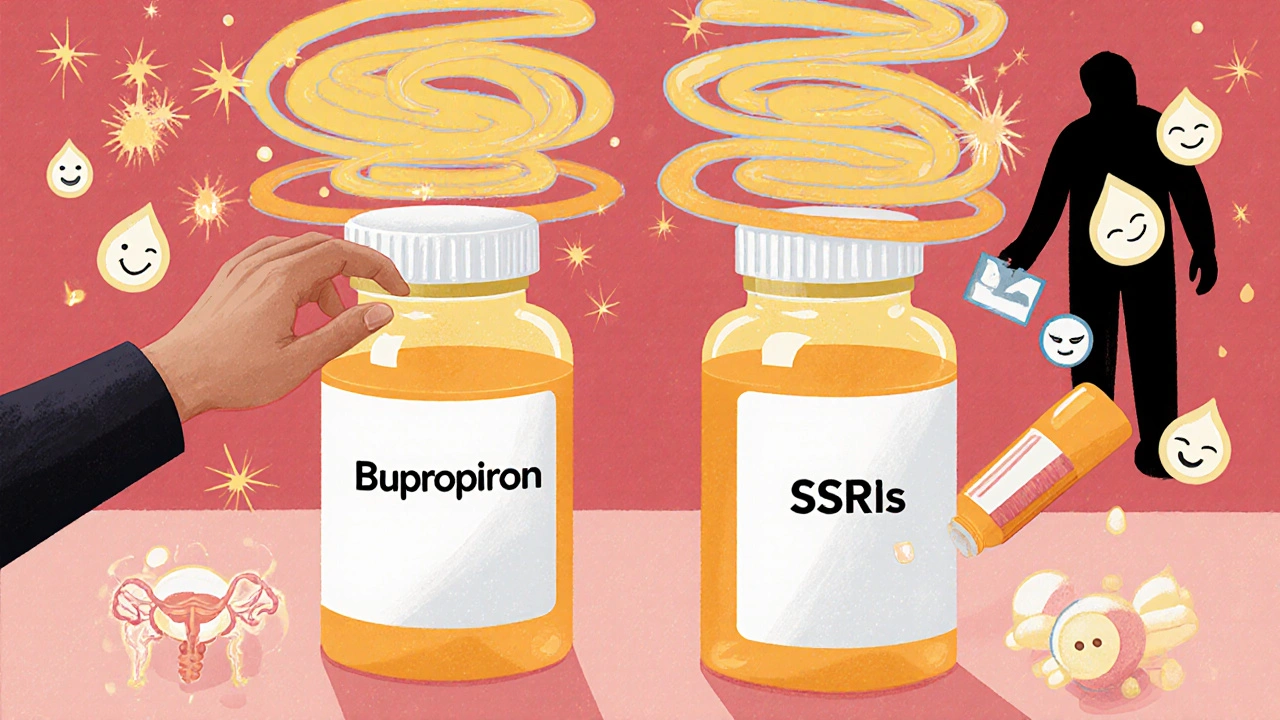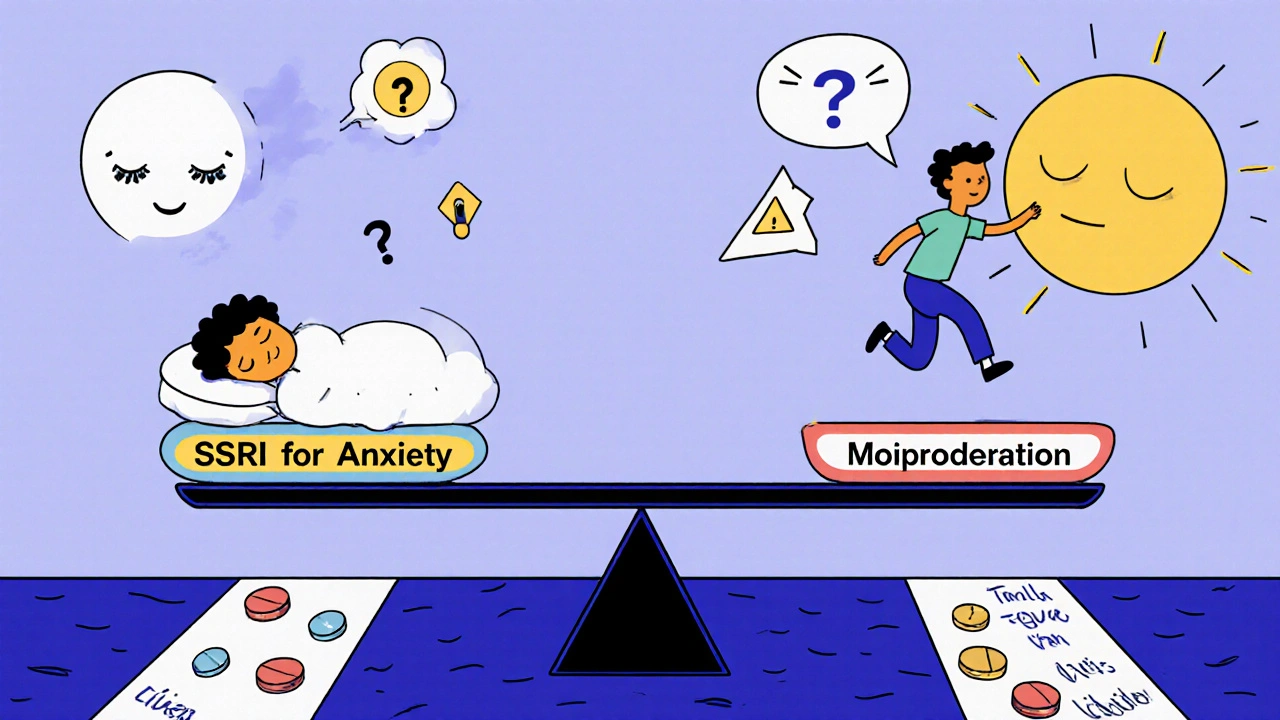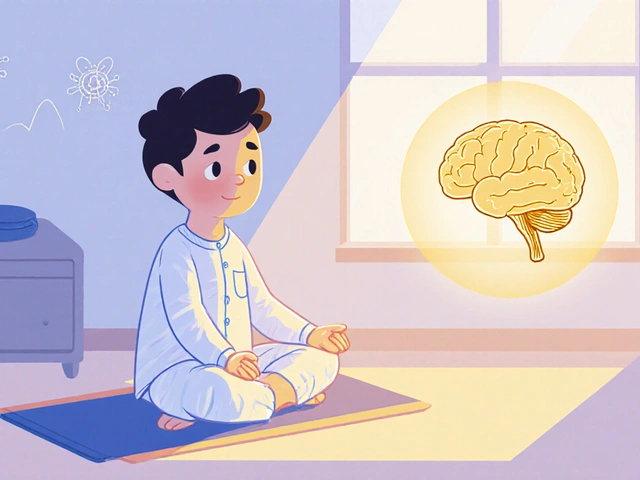
Antidepressant Side Effect Selector
Which Antidepressant Is Right for You?
Based on your specific concerns, this tool helps you compare the side effect profiles of bupropion versus SSRIs. Select your top concerns and we'll show you which medication may better suit your needs.
Your Priorities
Select which side effects concern you most:
Your Personalized Recommendation
How Each Antidepressant Affects Your Concerns
Bupropion
SSRIs
When choosing an antidepressant, most people don’t start by asking which one works best. They ask: Which one won’t make me feel worse? That’s where bupropion and SSRIs split apart-not in how well they lift mood, but in how they change your body, your sex life, your sleep, and even your weight.
Both classes work. Studies show they’re about equally effective for depression. But the side effects? They’re worlds apart. If you’ve ever been told to just ‘stick with it’ because the side effects ‘will fade,’ you know how empty that advice feels when your libido vanishes, your stomach rebels, or you gain 20 pounds on a drug meant to help you feel better.
Sexual Side Effects: The Silent Dealbreaker
For many, sexual side effects are the number one reason people quit SSRIs. Up to 70% of people taking drugs like sertraline, fluoxetine, or escitalopram report problems with desire, arousal, or orgasm. It’s not rare. It’s the norm. One user on Drugs.com wrote: ‘Lost all interest in sex after 6 months.’ That’s not an outlier-it’s a pattern.
Bupropion? The opposite. Only about 13-15% of users report sexual side effects. That’s less than a quarter of what SSRIs cause. A 2015 study in the Journal of Sexual Medicine found that 67% of people who switched from an SSRI to bupropion saw their sex drive come back. Another 48% improved when bupropion was added to their SSRI regimen.
Why? SSRIs flood the brain with serotonin, which directly shuts down sexual response pathways. Bupropion doesn’t touch serotonin. It boosts norepinephrine and dopamine-chemicals linked to motivation, energy, and pleasure. That’s why so many people describe bupropion as the only antidepressant that didn’t kill their sex life.
Weight: Gain vs Loss
Weight gain is a major concern with SSRIs. Studies show people on paroxetine or sertraline gain an average of 2.5 to 3.5 kg (5.5-7.7 lbs) over six to twelve months. Some gain more. One user reported: ‘Gained 25 pounds in one year.’ That’s not just uncomfortable-it’s demoralizing, especially when you’re already struggling with depression.
Bupropion? It often leads to weight loss. In clinical trials, people lost an average of 0.8 to 1.2 kg (1.8-2.6 lbs) over the same period. Higher doses (400 mg/day) led to 7.2% weight loss over 24 weeks in one obesity study. That’s not a side effect-it’s a benefit for people trying to manage their weight while treating depression.
Why the difference? SSRIs increase appetite and slow metabolism. Bupropion suppresses appetite and increases energy expenditure. It’s the only antidepressant approved as part of a weight-loss combo drug (Contrave), paired with naltrexone. If weight is a priority, bupropion isn’t just an option-it’s often the best one.
Sleep and Energy: Sedated vs Stimulated
SSRIs like paroxetine and fluoxetine often cause drowsiness. People take them at night to manage it. But if you’re already exhausted from depression, being sedated all day doesn’t help. One user said: ‘I felt like a zombie on Zoloft.’
Bupropion does the opposite. It’s energizing. It’s why it’s sometimes prescribed for ADHD or fatigue. A 2008 review found bupropion caused somnolence in only 15% of users-less than half the rate of SSRIs. People report feeling more alert, focused, and motivated. ‘Finally feel awake during the day unlike when I took Zoloft,’ wrote one user.
But here’s the catch: that energy can backfire. If you have anxiety, bupropion can make it worse. Studies show 28% of people with anxiety disorders quit bupropion because it triggered restlessness, nervousness, or panic. SSRIs, despite their sedating effects, are better at calming anxiety. So if your depression comes with panic attacks or OCD, bupropion might not be the answer.

Seizure Risk: The Hidden Danger
Bupropion carries a seizure risk. It’s low-0.1% at 300 mg/day-but it’s real. That risk jumps to 0.4% at 400 mg/day. It’s why doctors won’t prescribe it to people with a history of seizures, eating disorders (like bulimia), or those on other medications that lower seizure threshold.
SSRIs? Almost no seizure risk-just 0.02% to 0.04%. That’s nearly 10 times lower than bupropion at higher doses. For most people, this isn’t a concern. But if you’ve ever had a seizure, even as a child, or you’re on certain pain meds or stimulants, bupropion is off the table.
Also, bupropion can raise blood pressure slightly-by 3 to 5 mmHg on average. That’s not huge, but it matters if you have hypertension. SSRIs usually don’t affect blood pressure, or may even lower it slightly. If you’re monitoring your BP, bupropion needs more attention.
Switching Between Them: What You Need to Know
If you’re switching from an SSRI to bupropion, timing matters. Fluoxetine (Prozac) sticks around for weeks. You need a two-week gap before starting bupropion. For other SSRIs like sertraline or escitalopram, one week is usually enough.
Why? Stopping an SSRI too fast can cause withdrawal-dizziness, brain zaps, nausea. Starting bupropion too soon can increase seizure risk or trigger serotonin syndrome, even though bupropion doesn’t raise serotonin. One case report documented a seizure in someone taking bupropion and escitalopram together, with no prior history.
Always taper your SSRI slowly. Never stop cold. And never combine bupropion with other antidepressants without close monitoring. Even though it’s common to ‘augment’ SSRIs with bupropion, it’s not risk-free.

What Patients Really Say
On Reddit’s r/mentalhealth, one person wrote: ‘Switched from Lexapro to Wellbutrin after 2 years of zero sex drive-within 3 weeks, my libido returned. Now I can’t sleep.’ That’s the trade-off: better sex, worse insomnia.
On Drugs.com, bupropion has a 7.4/10 rating. 68% say it helped. Common praises: ‘No weight gain,’ ‘I’m not tired anymore,’ ‘I feel like myself again.’ But 24% had bad experiences: ‘Severe anxiety,’ ‘Ringing in my ears never went away.’
SSRIs? Lower average rating: 6.8/10. Nearly half the negative reviews mention sexual side effects. A third mention weight gain. But many also say: ‘It calmed my panic attacks,’ ‘I finally stopped crying all day.’
A 2021 survey found 63% of patients preferred bupropion for fewer sexual side effects. But 71% of those with anxiety disorders preferred SSRIs. It’s not about which drug is ‘better.’ It’s about which side effects you can live with.
Who Should Choose What?
Choose bupropion if:
- You’re struggling with sexual side effects from another antidepressant
- You want to avoid weight gain-or even lose weight
- You feel sluggish or sleepy on other meds
- You don’t have anxiety, seizures, or high blood pressure
- You’re okay with possible insomnia or restlessness
Choose an SSRI if:
- You have anxiety, OCD, or panic disorder
- You have a history of seizures or eating disorders
- You’re on medications that lower seizure threshold
- You’re okay with potential weight gain or low libido
- You prefer a sedating effect to help with sleep
The Bottom Line
There’s no ‘best’ antidepressant. Only the best one for you. Bupropion and SSRIs are both effective. But their side effects are so different, they’re almost like different treatments entirely.
If your biggest problem is losing your sex drive or gaining weight, bupropion might be the answer. If your biggest problem is anxiety or panic, SSRIs might be safer. If you’re tired all day, bupropion could wake you up. If you’re already wired, SSRIs might help you slow down.
Doctors don’t just pick based on what works. They pick based on what you can tolerate. And that’s why side effect profiles matter more than you think.
Don’t settle for ‘it’s just a side effect.’ If it’s ruining your life, it’s not just a side effect-it’s a dealbreaker. Talk to your doctor. Ask about switching. Ask about alternatives. Your mental health deserves more than a pill that makes you feel worse in other ways.
Does bupropion cause weight gain like SSRIs?
No, bupropion typically causes slight weight loss or no change, while SSRIs often lead to weight gain. Studies show people on bupropion lose an average of 0.8-1.2 kg over 6-12 months, while those on SSRIs like paroxetine or sertraline gain 2.5-3.5 kg. Bupropion is even used in weight-loss combinations like Contrave.
Can I switch from an SSRI to bupropion safely?
Yes, but you need a washout period. For fluoxetine (Prozac), wait two weeks because it stays in your system for days. For other SSRIs like sertraline or escitalopram, one week is usually enough. Stopping abruptly can cause withdrawal symptoms, and starting bupropion too soon can increase seizure risk or trigger serotonin syndrome. Always follow your doctor’s tapering plan.
Why does bupropion help with sexual side effects?
Bupropion works on norepinephrine and dopamine, not serotonin. SSRIs increase serotonin, which directly suppresses sexual desire and function. Bupropion doesn’t interfere with those pathways, so libido, arousal, and orgasm are much less likely to be affected. Studies show 67% of people who switched from SSRIs to bupropion saw their sex drive return.
Is bupropion safe if I have anxiety?
It’s often not the best choice. Bupropion can worsen anxiety because it’s stimulating. Studies show 28% of people with anxiety disorders stop bupropion due to increased nervousness or panic. SSRIs are generally better for anxiety, even though they may cause sedation or sexual side effects. If anxiety is your main issue, an SSRI is usually preferred.
Can bupropion cause seizures?
Yes, but it’s rare. At 300 mg/day, the risk is about 0.1%. At 400 mg/day, it jumps to 0.4%. That’s why it’s not prescribed to people with seizure disorders, eating disorders, or those taking other drugs that lower seizure threshold. SSRIs have a seizure risk of only 0.02-0.04%. Always tell your doctor if you’ve ever had a seizure, even years ago.
Which antidepressant is more commonly prescribed?
SSRIs are far more common. About 70% of antidepressant prescriptions in the U.S. are SSRIs, with sertraline being the top choice. Bupropion makes up about 10% of prescriptions, making it the fourth most prescribed antidepressant. But its use is growing, especially for people switching due to sexual side effects or weight gain.
Do SSRIs affect blood pressure?
Most SSRIs have little to no effect on blood pressure. Some may even slightly lower it. Bupropion, however, can raise systolic blood pressure by 3-5 mmHg on average. If you have high blood pressure, your doctor may monitor you more closely if you take bupropion.
Is bupropion better than SSRIs overall?
It’s not better-it’s different. Both work well for depression. But bupropion wins on sexual function, weight, and energy. SSRIs win on anxiety control and safety for people with seizure risks. The best choice depends on your symptoms, medical history, and which side effects you can tolerate.
More people are starting to ask the right questions: not just ‘Will this help my depression?’ but ‘Will this ruin my life in other ways?’ That shift is changing how antidepressants are chosen. The future isn’t about one-size-fits-all pills. It’s about matching the drug to the person-and their side effect limits.
9 Comments
deepak kumar
November 20 2025
As someone from India who’s tried both, I can say this: SSRIs made me feel like a zombie on a hot train. Bupropion? I felt like I could finally clean my room, call my mom, and even flirt with the barista. 😊 But yeah, insomnia hit hard-like 3am staring at the ceiling hard. Still worth it. No weight gain, no dead libido. Just… alive. 🙏
Don Angel
November 21 2025
Let’s be real-no one talks about how SSRIs make you emotionally numb. Like, you stop crying… but you also stop laughing. Bupropion didn’t fix my depression, but it let me feel again. Even the anxiety? I’d rather be anxious and awake than sedated and hollow. I’m not saying it’s perfect-but it’s the first drug that didn’t make me feel like a ghost.
Emily Entwistle
November 21 2025
Y’all are acting like bupropion is some magical unicorn 🦄. I took it for 8 weeks. Lost 10 lbs, got my sex drive back… then started having panic attacks so bad I called 911. My therapist said, ‘Sweetie, you have anxiety. SSRIs are your friend.’ She was right. I’m back on sertraline. Sleep? Terrible. Libido? Gone. But I can breathe again. 💔
malik recoba
November 22 2025
i just wanna say thank you for writing this. i’ve been on zoloft for 3 years and i feel like a robot. my wife says i dont even smile anymore. i’m scared to switch but this made me feel like maybe there’s hope. not everyone gets it, but you did. thank you.
Sarbjit Singh
November 23 2025
Bro, I switched from escitalopram to Wellbutrin 6 months ago. No more weight gain, no more ‘I don’t wanna touch you’ vibes with my wife 😍. But yeah, I can’t sleep past 5am. I drink chamomile tea now and just accept it. Life’s trade-offs, man. 🤝
Jonathan Gabriel
November 24 2025
Interesting how we treat psychiatric meds like choosing a phone plan-‘Which one has better battery life?’ But here’s the real question: if your brain’s chemistry is broken, does it matter if the side effects are ‘less bad’? Or are we just optimizing for convenience while ignoring the fact that depression isn’t a UX problem? 🤯
Dave Pritchard
November 25 2025
For anyone considering switching: talk to your doctor, yes-but also track your symptoms. I used a simple journal app. Noticed my anxiety spiked on day 4 of bupropion, but my energy returned by day 10. By day 21, my libido was back. Side effects aren’t static. Give it time. And if it doesn’t fit? It’s okay to switch again. You’re not failing-you’re fine-tuning.
benedict nwokedi
November 27 2025
Of course you’re all ignoring the elephant in the room: bupropion’s dopamine effect is why Big Pharma quietly pushed it for ‘off-label’ ADHD use in the 2010s. They knew it was a gateway. Now it’s ‘the antidepressant for the woke generation’-but let’s not pretend it’s not a mild stimulant with a side of existential dread. The real answer? Therapy. And maybe… a better life. But hey, at least you’ve got your libido back. 😏






kim pu
November 19 2025
Okay but have you seen the FDA’s 2023 adverse event database? Bupropion’s seizure reports spiked 300% after they let pharmacists prescribe it like it’s Advil. They’re not telling you this, but the real reason SSRIs still dominate is because Big Pharma doesn’t make enough margin on Wellbutrin. Also, the ‘weight loss’ thing? It’s just appetite suppression-same as phentermine. You’re just trading one addiction for another. 🤔